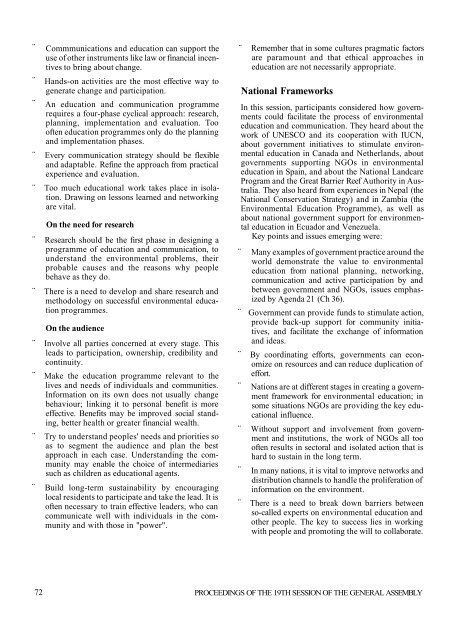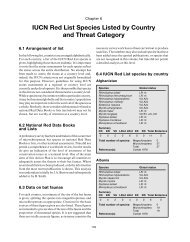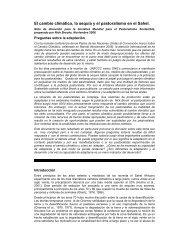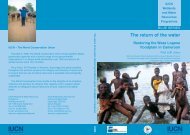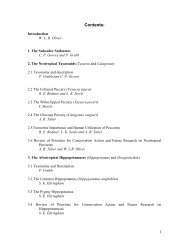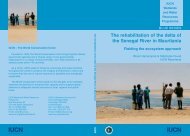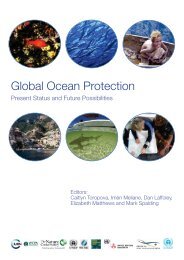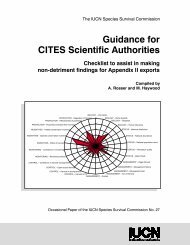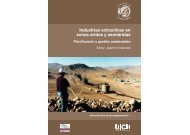Buenos Aires, Argentina - IUCN
Buenos Aires, Argentina - IUCN
Buenos Aires, Argentina - IUCN
You also want an ePaper? Increase the reach of your titles
YUMPU automatically turns print PDFs into web optimized ePapers that Google loves.
¤<br />
¤<br />
¤<br />
¤<br />
¤<br />
¤<br />
¤<br />
Commmunications and education can support the<br />
use of other instruments like law or financial incentives<br />
to bring about change.<br />
Hands-on activities are the most effective way to<br />
generate change and participation.<br />
An education and communication programme<br />
requires a four-phase cyclical approach: research,<br />
planning, implementation and evaluation. Too<br />
often education programmes only do the planning<br />
and implementation phases.<br />
Every communication strategy should be flexible<br />
and adaptable. Refine the approach from practical<br />
experience and evaluation.<br />
Too much educational work takes place in isolation.<br />
Drawing on lessons learned and networking<br />
are vital.<br />
On the need for research<br />
Research should be the first phase in designing a<br />
programme of education and communication, to<br />
understand the environmental problems, their<br />
probable causes and the reasons why people<br />
behave as they do.<br />
There is a need to develop and share research and<br />
methodology on successful environmental education<br />
programmes.<br />
On the audience<br />
¤ Involve all parties concerned at every stage. This<br />
leads to participation, ownership, credibility and<br />
continuity.<br />
¤ Make the education programme relevant to the<br />
lives and needs of individuals and communities.<br />
Information on its own does not usually change<br />
behaviour; linking it to personal benefit is more<br />
effective. Benefits may be improved social standing,<br />
better health or greater financial wealth.<br />
¤ Try to understand peoples' needs and priorities so<br />
as to segment the audience and plan the best<br />
approach in each case. Understanding the community<br />
may enable the choice of intermediaries<br />
such as children as educational agents.<br />
¤<br />
Build long-term sustainability by encouraging<br />
local residents to participate and take the lead. It is<br />
often necessary to train effective leaders, who can<br />
communicate well with individuals in the community<br />
and with those in "power".<br />
Remember that in some cultures pragmatic factors<br />
are paramount and that ethical approaches in<br />
education are not necessarily appropriate.<br />
National Frameworks<br />
In this session, participants considered how governments<br />
could facilitate the process of environmental<br />
education and communication. They heard about the<br />
work of UNESCO and its cooperation with <strong>IUCN</strong>,<br />
about government initiatives to stimulate environmental<br />
education in Canada and Netherlands, about<br />
governments supporting NGOs in environmental<br />
education in Spain, and about the National Landcare<br />
Program and the Great Barrier Reef Authority in Australia.<br />
They also heard from experiences in Nepal (the<br />
National Conservation Strategy) and in Zambia (the<br />
Environmental Education Programme), as well as<br />
about national government support for environmental<br />
education in Ecuador and Venezuela.<br />
Key points and issues emerging were:<br />
Many examples of government practice around the<br />
world demonstrate the value to environmental<br />
education from national planning, networking,<br />
communication and active participation by and<br />
between government and NGOs, issues emphasized<br />
by Agenda 21 (Ch 36).<br />
Government can provide funds to stimulate action,<br />
provide back-up support for community initiatives,<br />
and facilitate the exchange of information<br />
and ideas.<br />
By coordinating efforts, governments can economize<br />
on resources and can reduce duplication of<br />
effort.<br />
Nations are at different stages in creating a government<br />
framework for environmental education; in<br />
some situations NGOs are providing the key educational<br />
influence.<br />
Without support and involvement from government<br />
and institutions, the work of NGOs all too<br />
often results in sectoral and isolated action that is<br />
hard to sustain in the long term.<br />
In many nations, it is vital to improve networks and<br />
distribution channels to handle the proliferation of<br />
information on the environment.<br />
There is a need to break down barriers between<br />
so-called experts on environmental education and<br />
other people. The key to success lies in working<br />
with people and promoting the will to collaborate.<br />
72 PROCEEDINGS OF THE 19TH SESSION OF THE GENERAL ASSEMBLY<br />
¤<br />
¤<br />
¤<br />
¤<br />
¤<br />
¤<br />
¤<br />
¤


